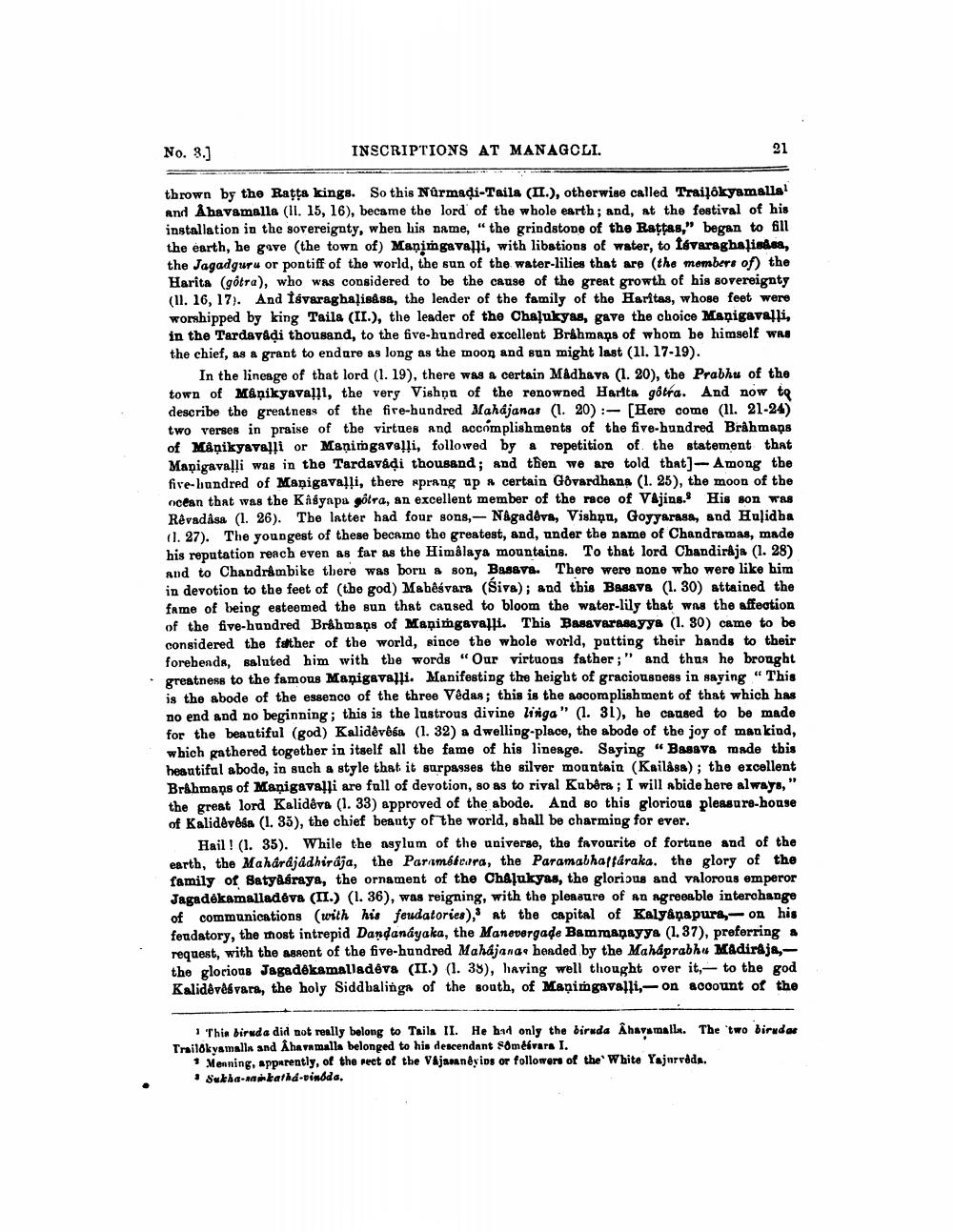________________
No. 3.)
INSCRIPTIONS AT MANAGCLI.
21
thrown by the Ratta kings. So this Nûrmadi-Taila (II.), otherwise called Trailokyamalla! and Åhavamalla (II. 15, 16), became the lord of the whole earth; and, at the festival of his installation in the sovereignty, when his name," the grindstone of the Rattas," began to fill the earth, he gave (the town of) Manimgavalli, with libations of water, to føvaraghalisiss, the Jagadguru or pontiff of the world, the sun of the water-lilies that are (the members of the Harita (gotra), who was considered to be the cause of the great growth of his sovereignty (u. 16, 17). And tgvaraghalissa, the lender of the family of the Haritas, whose feet were worshipped by king Taila (II.), the leader of the Chalukyas, gave the choice Maņigavalli, in the Tardavadi thousand, to the five-hundred excellent Brahmans of whom be himself was the chief, as a grant to endure as long as the moon and sun might last (11. 17-19).
In the lineage of that lord (1. 19), there was a certain Madhava (1. 20), the Prabhu of the town of Manikyavalli, the very Vishnu of the renowned Harita gôtra. And now to describe the greatness of the fire-hundred Mahajanas (1. 20):- (Here come (11. 21-24) two verses in praise of the virtues and accomplishments of the five-hundred Brahmans of Mâņikyavalli or Manimgavalli, followed by a repetition of the statement that Mapigavalli was in the Tardavadi thousand; and then we are told that)- Among the fire-hundred of Manigavalli, there sprang ap & certain Govardhans (1. 25), the moon of the ocean that was the Kinynpa gotra, an excellent member of the race of Vajins. His son was Rêvadása (1. 26). The latter had four sons - Någadeva, Vishna, Goyyarasa, and Holidba 01. 27). The youngest of these became the greatest, and, under the name of Chandramas, made his reputation rench even as far as the Himalaya mountains. To that lord Chandiraja (1. 28) and to Chandrambike tbore was born a son, Basava. There were none who were like him in devotion to the feet of the god) Mahêsvara (Siva); and this Basava (1. 30) attained the fame of being esteemed the sun that caused to bloom the water-lily that was the affection of the five-hundred Brahmans of Maņingavalli. This Basavarasayya (1. 80) came to be considered the father of the world, since the whole world, putting their hands to their forebenda, saluted him with the words “Our virtuoas father;" and thus he brought greatness to the famous Manigavati. Manifesting the height of graciousness in saying " This is the abode of the essenco of the three Vedas; this is the accomplishment of that which has no end and no beginning; this is the lustrous divine linga" (1. 31), he caused to be made for the beautiful (god) Kalidêvesa (1. 32) a dwelling-place, the abode of the joy of mankind, which gathered together in itself all the fame of his lineage. Saying “ Basave made this heautiful abode, in such a style that it surpasses the silver mountain (Kailasa); the excellent Brahmaps of Manigavalli are full of devotion, so as to rival Kubera ; I will abide here always," the great lord Kalidêva (1. 33) approved of the abode. And so this glorious pleasure-house of Kalideresa (1.35), the chief beants of the world, shall be charming for ever.
Hail! (1. 35). While the asylum of the universe, the favourite of fortune and of the earth, the Maharajadhiraja, the Parimé cura, the Paramabhaftáraka. the glory of the family of Satyasraya, the ornament of the Chalukyas, the glorious and valorous emperor Jagadekamalladéva (II.) (1. 36), was reigning, with the pleasure of an agreeable interchange of communications with his foudatories), at the capital of Kalyanapura, on his feudatory, the most intrepid Dandanayaka, the Manevergade Bammanayya (1, 37), preferring a request, with the assent of the five-hundred Mahajang, headed by the Maháprabhu Madiraja, - the glorious Jagadékamalladeva (II.) (1. 38), having well thought over it, to the god Kalidêvé vara, the holy Siddhalinga of the south, of Manimgavalli-on account of the
1 Thin biruda did not really belong to Tails II. He had only the biruda Åhavsmall. The two biridas Trailokyamalla and Ahavamalla belonged to his descendant soméivars I.
+ Menning, apparently, of the rest of the Vájamneyips or followers of the White Yajnreds. • Sukha- katha-vindda.




